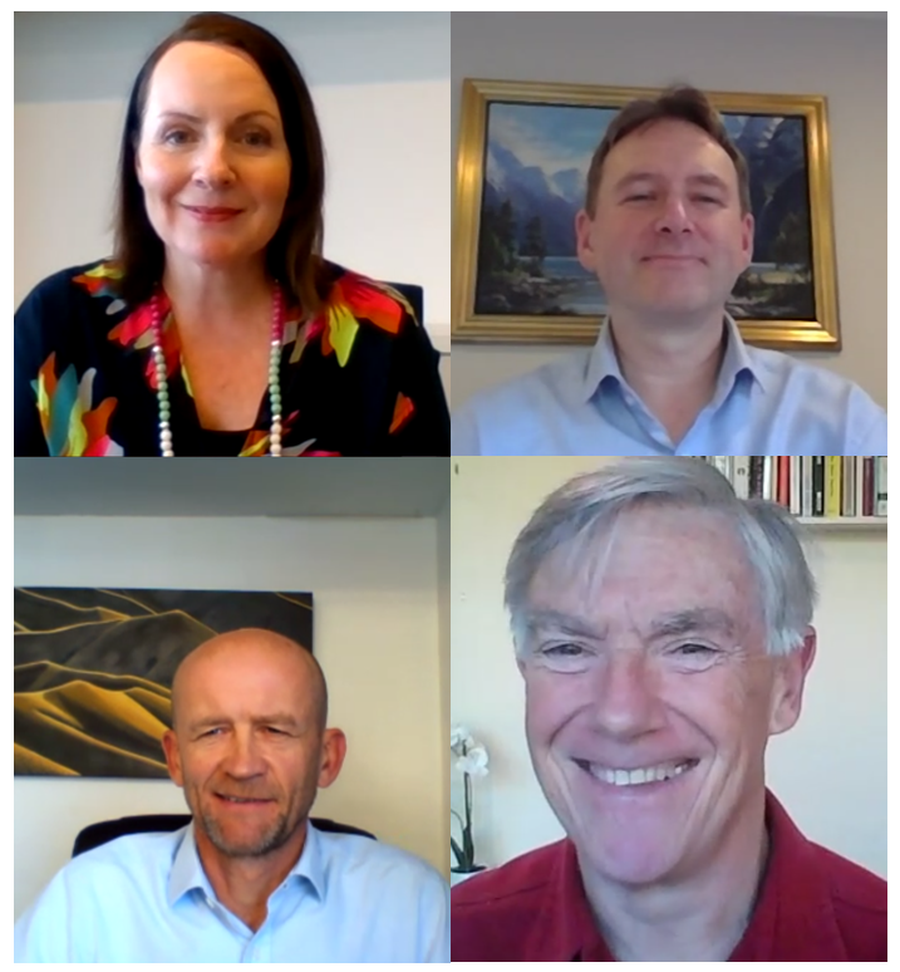Learn
Seminar Series: What’s ESG management and why does it make a difference?
28th May 2020
Barry Coates, founder and CEO of Mindful Money speaks with panelists Philip Houghton-Brown – Chief Investment Officer for Mercer Funds, Simon O’Grady – Chief Investment Officer for Kiwi Wealth, and Rebekah Swan – ESG Specialist at AMP Capital about the key aspects of ESG management.
Barry Coates, founder and CEO of Mindful Money welcomed the participants and introduced the panelists:
- Philip Houghton-Brown – Chief Investment Officer for Mercer Funds
- Simon O’Grady – Chief Investment Officer for Kiwi Wealth
- Rebekah Swan – ESG Specialist at AMP Capital

The seminar started with an outline of the three key aspects of ESG management. Simon O’Grady provided an overview of ESG - Environmental, Social and Governance – analysis. These are the three main elements of responsible investing. It is applied in three different ways:
- To identify companies to avoid because of high risks from their ESG performance. Most funds have some level of exclusions, either as a sector (eg. tobacco companies) or individual companies (eg. ESG analysis may be used to apply a screen across a large number of companies in a portfolio).
- To inform governance of companies (eg. through the use of direct voting or proxies for governance of companies)
- To identify more in-depth analysis of a small number of companies, typically in an active portfolio to select companies with high ESG standards
Simon explained that Kiwi Wealth has an emphasis on an engagement approach. For example, Kiwi Wealth does not exclude all fossil fuel companies, but engage with companies that can be part of the solution, such as through investing in renewable energy. They use external ratings agencies, like Sustainalytics, to support their analysis.
Philip Houghton-Brown explained how ESG analysis is applied to constructing portfolios. He explained that Mercer, like many other fund managers, are managers of managers. They invest in specialised funds for particular geographies and types of assets. Mercer rates these managers on the degree to which their incorporate ESG factors and stewardship (ie. engagement).
Managers will tilt their portfolios towards higher rated ESG companies, through selecting ‘best in class’ companies or selecting those companies where there is potential for improvement. Other strategies target a particular theme such as health, education, waste management, renewable energy or freshwater.
Rebekah Swan explained that AMP Capital is an active manager, engaging with management and Boards to achieve better ESG performance. This includes voting at Board meetings, either directly or through proxy voting (ie. nominating a specialised agency to vote on their behalf). This may be on issues like management salaries or a climate change strategy.
Engaging on ESG issues provides benefits both to investors and to the company – it ensures that companies are accountable to their investor base. It provides feedback on issues where the company needs to do more or re-think their approach. The funds manager should then use the information to inform investors and let them know how their investments are influencing companies.
Barry noted that most funds say they are ESG investors and members of the public are often confused about which companies are really serious in applying ESG. He explained that Mindful Money’s online platform features the funds that have been certified for ESG by the Responsible Investment Association of Australasia (RIAA), the only credible form of certification at present. Mercer, Kiwi Wealth and AMP Capital are all RIAA certified.
Rebekah gave a list of the ways that AMP Capital’s engagement has made a difference, often in collaboration with others:
- Drawing attention to company use of slave-like labour in its supply chain in 2006
- Investigation into clothing companies in the wake of the Rana Plaza collapse
- Collaboration with other fund managers to support the development of a Modern Slavery Act in Australia, bringing transparency into supply chains
- Questions to the big banks about their funding for companies lending to vulnerable people at exorbitant interest rates (payday lending)
- Opposition to automatic pay increases for directors
They are now advocating a living wage for factory workers; child labour in cocoa supply chains; safeguarding personal information on social media; pressure for regulation on social media companies in the wake of the Christchurch atrocity as part of a broad coalition of NZ Super Fund and investment funds; gender diversity, equal pay and climate change.
Kiwi Wealth added examples of their advocacy of Starbucks to get rid of plastic straws; the pressure on oil companies to declare their carbon footprint; and action on companies like BHP that are starting to change their business in response to investor pressure. There is a groundswell of investor action that is starting to have a major impact on corporations.
In addition to engagement and stewardship impacts, Philip explained that corporations are influenced by the decision on whether to invest or not. If investors don’t invest in companies with poor ESG records, it makes it more expensive for companies to raise capital, so managers have a strong incentive to raise their ESG standards.
Philip noted that Mercer invests in unlisted assets, like property and infrastructure, as well as listed companies. They can see direct impacts from targeting property companies investing in energy-efficient buildings and investments in renewable energy, waste treatment facilities, etc.
Barry pointed out there will be a seminar session in future on the development of positive impact investment funds (‘impact investment’). Despite considerable public interest, there are currently no impact funds available to retail investors in New Zealand, although there are a number of funds internationally.
Simon pointed out there is ample research confirming that ESG management addresses important risk factors for business and all fund managers should take ESG issues into account. In addition, there is now empirical evidence that excluding poor ESG performers leads to better returns. This stands to reason – companies performing poorly in environmental impacts of social conditions of with poor governance systems will have lower returns. There are also possibilities to earn higher returns when influencing companies to improve their ESG performance.
Rebekah referred to the fact that around 80% of company value is intangible assets, such as company reputation, and this value is heavily influenced by a company’s environmental and social performance. She agreed that, over the long term, higher ESG will result in higher returns, but there may be cycles when returns are lower (eg. if fossil fuel companies recovered for a period).
Philip pointed out that there are thousands of studies and studies of studies showing outperformance of ethical funds over the long term. But he noted that it isn’t an automatic relationship – it takes skill and investment expertise.
In response to a question on ESG frameworks, Philip pointed out that the Climate Related Financial Disclosures (TCFD) approach to reporting is likely to become mandatory in New Zealand. He also favours reporting against the UN Sustainable Development Goals (SDGs). Simon said that carbon footprinting is becoming standard; measures of diversity for Boards and more widely in companies; and big data is allowing the use of additional data like staff surveys. Rebekah explained that AMP Capital does much of the analysis in-house, and reports against the SDGs.
Standardised metrics would be good to allow comparable data, such as diversity, carbon footprint and an aggregate measure of climate risk. NZX has listing rules but not all companies are disclosing comparable information in the same format. Philip supported independent certification for fund managers, such as RIAA, and greater level of transparency, as provide for by Mindful Money. Barry noted that the lack of comparability is a problem for the public in trying to compare different investment funds.
The panel addressed the issue of greenwashing. Certification is important to ensure credibility – it needs to be independent and objective. RIAA has made some changes to their certification system and will introduce rating levels, supported by evidence that would be made public. Simon noted that, as well as RIAA certification, the Principles of Responsible Investment has a reporting system on ESG metrics.
Barry explained that the Mindful Money approach provides objective assurances for the New Zealand KiwiSaver and managed fund investors. Verification of ethical standards is achieved through RIAA certification (including Mercer, Kiwi Wealth and AMP Capital funds) and transparency on portfolio holdings.
In concluding, Simon noted that the battle is over whether ESG investing earns good returns – it does. Now that it is growing, there are exciting opportunities for raising standards. Rebekah is looking forward to AMP Capital’s ongoing work on climate change and impact investment. And Philip talked about Mercer’s research reports on climate change, as well as their work on developing impact investment products.

With thanks to our principal sponsors - Generate KiwiSaver, Harbour Asset Management, Booster Asset Management, and Sustainalytics; contributing sponsors - AMP Capital, Harbour Asset Management, Mercer and Milford Asset Management; and supporting sponsor - Devon Funds Management.

